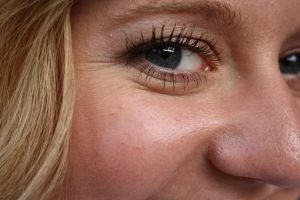Written by Joyce Smith, BS. Supplementation with a BioCell Collagen, a combination of hydrolyzed collagen type II, chondroitin sulfate, and hyaluronic acid, reduced visible and measurable markers of facial skin aging, including crow’s feet and lines and wrinkle depth.
 Many factors contribute to skin aging. Skin collagen that breaks down and declines with age, photoaging due to excessive sun exposure, and lifestyle factors such as smoking and prolonged exposure to environmental pollutants are all contributors. Additional factors include radical oxygen species (ROS) and reactive nitrosative species (RNS) from overexposure to ultraviolet light that lead to inflammation, immune system suppression, erythema and pigmentation and contribute further to collagen breakdown and production, accelerating the skin aging process. 1 Nicotine from cigarettes vasoconstricts blood vessels in the epidermis to impair blood flow and undernourish the skin. 2 Just one cigarette can constrict blood flow in the skin for more than 30 minutes 3, while chronic smoking can reduce skin elasticity and collagen production 4.
Many factors contribute to skin aging. Skin collagen that breaks down and declines with age, photoaging due to excessive sun exposure, and lifestyle factors such as smoking and prolonged exposure to environmental pollutants are all contributors. Additional factors include radical oxygen species (ROS) and reactive nitrosative species (RNS) from overexposure to ultraviolet light that lead to inflammation, immune system suppression, erythema and pigmentation and contribute further to collagen breakdown and production, accelerating the skin aging process. 1 Nicotine from cigarettes vasoconstricts blood vessels in the epidermis to impair blood flow and undernourish the skin. 2 Just one cigarette can constrict blood flow in the skin for more than 30 minutes 3, while chronic smoking can reduce skin elasticity and collagen production 4.
A previous (2012) study by Schwartz and team suggested that ingestion of BioCell Collagen, a novel hydrolyzed chicken sternal cartilage extract, enhanced blood microcirculation and reduced facial signs of aging. The study’s objective 5 was to determine whether a 12-week daily supplementation with BioCell Collagen could visibly reduce the common signs of aging. In a randomized, double-blind, placebo-controlled clinical trial, 128 females, aged 39 to 59, were assigned to either a twice-daily placebo, or twice-daily 500 mg of BioCell Collagen that was derived from a chicken sternal cartilage containing a matrix of hydrolyzed collagen type II, chondroitin sulfate, and hyaluronic acid.
The primary outcomes included measurements of transepidermal water loss, viscoelasticity, hydration, collagen content, chromophore (melanin) content, hemoglobin level, and photographic analysis (facial lines and wrinkles, crow’s feet lines and wrinkles, skin texture and smoothness , and skin tone). Secondary outcomes were tolerance of BioCell Collagen, occurrence of adverse events, and the participant’s perception of the supplement’s value.
Results showed that compared to placebo, those taking the collagen supplement saw a significant reduction in facial lines and wrinkles (p=0.019), crow’s feet lines and wrinkles (p=0.05), increased skin elasticity (p=0.008), decreased wrinkle width (6.04%, P<0.001), skin dryness (P < .001) and redness (P<0.02). There was a statistically significant increase of 12% in dermal collagen following 12 weeks of supplementation with BioCell (P < .001) In addition, after both six and twelve weeks of supplementation, participants expressed a significantly positive perception of BioCell Collagen’s effectiveness on facial skin. No difference was seen between the supplement and placebo for skin surface water content or retention. The supplement was well tolerated, with no reported adverse reactions
Study limitations include the use of only female participants who were 39 years of age or older, making generalization to younger age groups impossible. Since the study was conducted over the summer months (May-September) when UV radiation exposure was higher, it is not known whether the summer months and higher UV radiation levels impacted the results. Also, only an indirect measure of skin collagen was done; thus, researchers found it difficult to conclude that collagen synthesis increased in response to BioCell when compared to placebo.
Source: Schwartz, Stephen R., Kimberly A. Hammon, Anna Gafner, Amanda Dahl, Norman Guttman, Michelle Fong, and Alexander G. Schauss. “Novel Hydrolyzed Chicken Sternal Cartilage Extract Improves Facial Epidermis and Connective Tissue in Healthy Adult Females: A Randomized, Double-Blind, Placebo-Controlled Trial.” Alternative Therapies in Health & Medicine 25, no. 5 (2019).
© This article is protected by copyright
Posted June 9, 2020.
Joyce Smith, BS, is a degreed laboratory technologist. She received her bachelor of arts with a major in Chemistry and a minor in Biology from the University of Saskatchewan and her internship through the University of Saskatchewan College of Medicine and the Royal University Hospital in Saskatoon, Saskatchewan. She currently resides in Bloomingdale, IL.
References:
- Chung JH, Kang S, Varani J, Lin J, Fisher GJ, Voorhees JJ. Decreased extracellular-signal-regulated kinase and increased stress-activated MAP kinase activities in aged human skin in vivo. The Journal of investigative dermatology. 2000;115(2):177-182.
- Morita A. Tobacco smoke causes premature skin aging. J Dermatol Sci. 2007;48(3):169-175.
- Jensen JA, Goodson WH, Hopf HW, Hunt TK. Cigarette smoking decreases tissue oxygen. Archives of surgery (Chicago, Ill : 1960). 1991;126(9):1131-1134.
- Just M, Ribera M, Monsó E, Lorenzo JC, Ferrándiz C. Effect of smoking on skin elastic fibres: morphometric and immunohistochemical analysis. Br J Dermatol. 2007;156(1):85-91.
- Schwartz SR, Hammon KA, Gafner A, et al. Novel Hydrolyzed Chicken Sternal Cartilage Extract Improves Facial Epidermis and Connective Tissue in Healthy Adult Females: A Randomized, Double-Blind, Placebo-Controlled Trial. Altern Ther Health Med. 2019;25(5):12-29.
